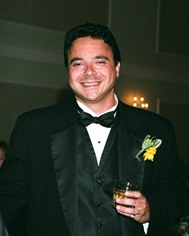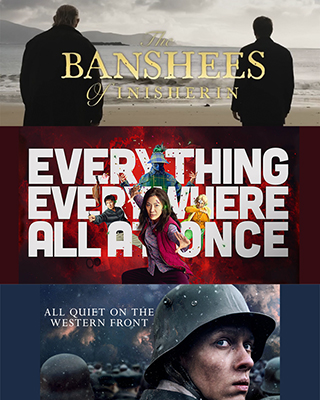With the Oscars being presented on Sunday, March 12th, I like to focus on the films and performances that I found most memorable. In keeping with the tradition of the late Siskel & Ebert’s “If We Picked the Winners,” here are my standouts for 2022 using the nominees in the main Academy Award categories. While others try to second-guess Oscar politics with who ‘should win’ or ‘will win,’ I like to keep it simple. In case you missed any of them, these are the films and performances I’ll remember- simply put, these are the ones:
Best original screenplay- Martin McDonagh; Best supporting actor- Barry Keoghan; Best supporting actress- Kerry Condon: “The Banshees of Inisherin”
Thanks to Martin McDonagh’s skillfully-crafted screenplay, “Banshees” is a scathing fable of our inescapable fallibility as human beings.
With a civil war-entrenched1923 Ireland serving as its background, “Banshees” mirrors the mainland’s fighting with a small skirmish on the nearby island of Inisherin where Colm (Brendan Gleeson) tells pal Padraic (Colin Farrell) he doesn’t want to be around him anymore. Why the fight? Colm’s just tired of Pad. Pad can’t accept it and their story starts a downward spiral where emotions and motives intermingle but never completely compromise. Though Colm and Pad are the protagonists, McDonagh channels Shakespeare with a script using supporting characters to show other humanistic aspects affected by Colm and Pad’s dilemma.
Kerry Condon scores as Pad’s sister Siobhan, would-be arbitrator between Colm and Pad. Seeking escape herself from a lonely existence and a seeming dead-end destiny as a spinster caring for her brother, Siobhan wants to settle the silliness between these stubborn men while trying to extricate herself from a humdrum existence. Giving the audience access into observing the island’s idiocy, Condon delivers an expertly exasperated performance as the film’s ‘straight man’ and voice of sanity.
For Barry Keoghan, his role as Dominic personifies Inisherin’s simple life. Outspoken but with nervous quirky gestures and shy twists of the head, Keoghan is every bit the childlike, intellectually-stunted town simpleton. However, when Dominic professes his love to Siobhan knowing full well he’ll be shot down, it’s a heartbreaker. In showing tenderness beneath the temerity, Keoghan surprises and surpasses expectations for his seemingly superficial comic relief role.
Best actress- Andrea Riseborough: “To Leslie”
Take a woman who’s lost everything except the crutches of cigarettes and alcohol. Take a woman looking to rebuild her life and repair estrangement from her only child. Take a woman who’s reached bottom, whose nerves are shot and is hanging on by a thread with one last chance at redemption. Take a look at Andrea Riseborough as Leslie Rowland.
Based on the true story of the West Texas woman who managed to turn her life around after squandering a sizable sum of lottery money, it’s easy to see why Hollywood A-listers held screenings of this little-seen indie to get Riseborough the nomination. Apart from being a well-respected British actress pulling off a tough Texas dialect, Riseborough gives one of the best alcoholic film performances you’ll see (the champ still being Albert Finney in “Under the Volcano”).
Watch the scene where a drunken Leslie tries to pick up a man in a honky-tonk thinking she’s being seductive but only coming across as clownish or bearing her soul to employer/boyfriend Sweeney (Marc Maron) in the off-chance he’ll be in her corner and Riseborough does what few actors can: finding the heart in the hopeless and making you care about what becomes of them.
Best actor- Austin Butler: “Elvis”
Given the unenviable task of portraying a pillar of pop culture, it seems simple to say looking and sounding the part goes a long way. And for Butler it initially does, nailing the look and sound of the puppy dog-eyed pretty boy clad in pink with the slow Southern drawl that made Elvis Presley a teen heartthrob.
But with a highly-stylized director like Baz Luhrmann and acting opposite Tom Hanks prosthetically made-up to resemble Mr. Potato Head more than Col. Tom Parker in a Faustian tale of how Elvis made a ‘deal with the devil’ for fame, you’d expect Butler’s King of Rock and Roll to be a jaded jumpsuit-wearing Kabuki theatre cautionary tale. But Butler avoids this crash-and-burn by bringing Elvis to life when performing his new signature musical sound, a hybrid blues/country concoction with pelvic moves conveying Elvis’ passion for the music.
In accurately recreating Elvis’ onstage energy fueled by the spiritual foundation he felt to the songs he performed, Butler kept the essence of Elvis intact and preserved people’s connection to who they felt may have been the last musical Messiah.
Best director- Daniel Kwan & Daniel Scheinert: “Everything Everywhere All At Once”
After Marvel Comics jammed the multiverse down our throats, how refreshing it was to see two guys who brought more energy into expanding dimensions than all of the CG effects Marvel could muster.
In a story of ‘the road not taken’ and what would happen if past decisions were changed, directors Kwan and Scheinert (known as ‘Daniels’), kicked it old school by ramping up time-travel effects with flashing colors and camera moves that propelled characters into parallel dimensions. Not since Sam Raimi’s “Evil Dead” movies or Barry Sonnenfeld’s work in the early Coen Brothers films have I seen camera movements put to as good a use as what Daniels employ in “Everything.”
Add giving the audience a cohesive storyline unfazed by the trippy introduction of superhero subplots and avoiding the confusion of overlaps by using split screens to show the effects of alternate outcomes and you’ve got two directors who know what they’re doing.
Best picture; Best adapted screenplay- Edward Berger & Lesley Paterson and Ian Stokell: “All Quiet on the Western Front”
Wondering why Germany never made one of its own soldier’s anti-war anthems into a movie, German-born director Edward Berger took it upon himself to do so. Co-writing an adaptation that would be faithful to author Erich Maria Remarque’s horrific accounts of WWI’s trench warfare yet also add a new parallel storyline of a race for armistice before more soldiers were senselessly killed gave “Western Front” an enlivened, empathetic push to the end.
Following a young German soldier named Paul (Felix Kammerer) who fervently enlists with his friends to save the Fatherland, his vigor soon vacates when Paul watches his fellow countrymen get eviscerated by bombs, bullets and collapsing bunkers. Complimented by a screen adaptation that shows how unnatural war is by showing the devastation upon nature itself as well as the complexities war has for those wanting to fight, wanting to flee or simply wanting to forget- well, its story’s still important enough to impress.
“Western Front’s” cinematic influence can’t be overstated: while Spielberg’s “Saving Private Ryan” or Sam Mendes’ “1917” readily spring to mind for the way audiences are put side-by-side with soldiers to simulate a first-hand experience to the horrors of war, anti-war films like Peter Weir’s “Gallipoli,” Wolfgang Peterson’s “Das Boot” or Oliver Stone’s own “Western Front” account of being a soldier during the Vietnam War in “Platoon” just wouldn’t exist without Remarque’s 1929 novel.
By not accepting “Western Front’s” message of war’s futility almost a century after it was written, we’re still doomed to repeat watching future filmmakers’ pleas for peace.
Enjoy this year’s Oscars and in discovering the future Oscar winners of 2023.

